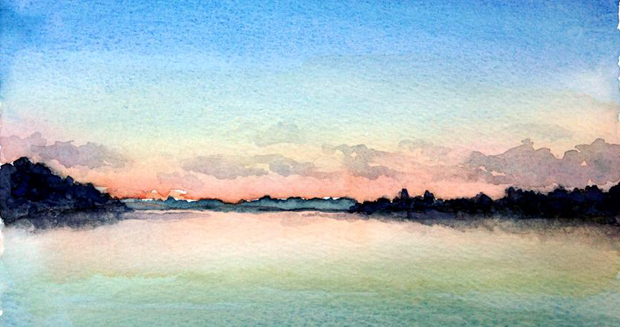Our boat had just been yanked one-hundred-eighty degrees, spun on her keel in the opposite direction, and was now screaming northward up the Bay, back the way we had come. In the blackness, we could see nothing – not land, not a buoy, not another boat or – ominously – any ships.
“Why did you tack?” I yelled, to be heard above the storm.
“I didn’t,” my husband answered. “I’m just going with the wind.”
He knew that resistance was not only futile; it would be dangerous and stupid in the face of such omnipotent, unseen forces. His unquestioning compliance was the right response in a situation like that: a sudden thunderstorm sweeping over us in the dead of night.
We had been motoring southward down the Chesapeake Bay, heading for the James River in Virginia. At about 1:00 a.m., I was on first watch with our friend and co-owner of the boat. We began to notice lightning flaring in the southern sky. Unknown to me at the time, he was in the early stages of dementia, so when I asked him to check the weather radio, I trusted his report that there were no storms forecast.
Unlike most of the Chesapeake, its western shore from the Patuxent River to south of the Potomac has very few safe harbors. As we passed by the last indentation along an otherwise forbidding shoreline, we formulated a hasty Plan B and turned towards a poorly marked cove, with a hurricane hole on its far side. When it began to rain and the wind and waves picked up, I woke my husband, who was below in the cabin sleeping. Our ten-year-old son was also below, with his best friend in the opposite bunk.
When Peter came up, donning his foul weather gear, we briefed him on the plan. He took an instant dislike to it for its reliance on our engine, which had just conked out. So we were sailing in a storm in the dark of night into a tiny inlet, guided only by daymarks, which were not illuminated and rendered mostly invisible in the swell of the water. A sure recipe for running aground – or worse.
During our debate, the storm seemed to lessen and by unanimous decision, with him at the helm, we headed back out to open water to continue on our original course southward.
The storm had other ideas.
As soon as we got clear of the cove and into open water, a deluge opened on us and the wind increased. In retrospect, we were blessed by an absence of lightning, which is often fierce in summer storms, so the smell of ozone and the prickle of electricity on neck hairs were not included in the sensory extravaganza. So much rain collected in my hat brim that I could tip it down and drink from the rivulet coursing down my face, alleviating the extreme drymouth caused by an overdose of adrenaline.
Chaos reigned in the cabin below. The boys’ cards, games and clothes were strewn about the cabin sole and mixed afresh each time the waves tossed the boat. They were awake and having a ball, treating the motion and wet as an amusement park ride.
Fear taunted me with melodramatic headlines like “Local Family Lost in Storm: No Survivors.” I replayed the sweet curbside moment when the mother of our son’s friend hugged us, saying, “He’s going to have a wonderful time.” And she meant it. With trust like that, I should have recognized the cheap foreshadowing.
I did the only thing I could think of to manage my runaway mind, that overeager reptilian brain that feeds on fear. I prayed. I said to the storm, “I see you and, yes, I am impressed. But now you’re showing off, your power is awesome; you don’t need to throw quite so much of it at us. I’m afraid, give me a break, please. We are helpless before you. We bow down.”
Then I recited poetry to myself. Rilke and Frost and Rumi and Hafiz – anyone I could think of. It had no affect on the storm, but it calmed me. Marie Howe’s “Annunciation” is particularly good for situations like this, although I work strenuously to never again be in a situation like this.
While I stood on the threshold of the companionway with a white-knuckled grip on the jamb, my husband held fast to the wheel. Normally so self-assertive (translation: he prefers to have things his way), he gave himself wholly and without hesitation to the storm, sailing into the vast darkness for as long as it took. It was a beautiful show of respect.
Shortly after dawn, we managed to limp into a marina on the Rappahannock River and locate a mechanic who could work on our air-choked fuel lines. In celebration of being alive, of being spit out after all by the mighty Chesapeake and her legendary storms, I sat with our friend on a bench dockside and drank rum on ice at 7:30 in the morning while the boys went off in search of a swimming pool.
The sort of determined acquiescence shown by my husband in the teeth of the storm is like his Sunday Best; he saves it for when Big Things are at stake: heartbreak, loss, careers, lives. It’s a quality of fierce humility and confident trust that will be useful in the storms ahead, those times when reality throws everything she’s got at us and we crash into our utter insignificance.

